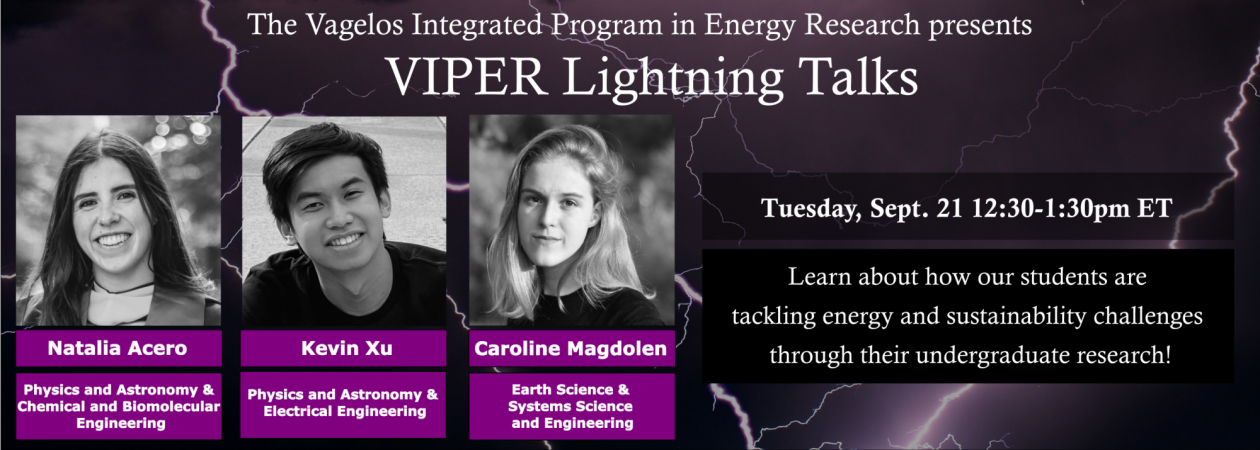
The Vagelos Integrated Program in Energy Research (VIPER) is a dual-degree undergraduate program at the University of Pennsylvania that prepares students to be the next generation of energy leaders. Join us to learn more about the work they are doing to address energy and sustainability challenges through their undergraduate research.
Graduates of the program gain an interdisciplinary perspective as they earn both a Bachelor of Arts from the School of Arts and Sciences as well as a Bachelor of Science in Engineering from the School of Engineering and Applied Science. VIPER students also participate in a dedicated on-ramp into research and conduct fully-funded, cutting-edge research experiences with renowned Penn faculty throughout their time in college. If you are interested in learning more about the program, visit http://viper.upenn.edu. VIPER accepts transfer applications from first-year Penn students.
Speakers

Natalia Acero
Natalia Acero is currently in her last semester in the VIPER program pursuing her Bachelor of Science in Engineering in Chemical and Biomolecular Engineering and Bachelor of Arts in Physics and Astronomy with a concentration in Business and Technology. She started working with Dr. Deep Jariwala from the Electrical and Systems Engineering department in the summer of her first year (2018) and continued in his lab until the end of her junior year. She initially worked on building ultra-thin semiconductors for solar cells and explored their potential in the space-based solar power industry. Later, she spent a year working on a fabrication technique for two-dimensional (ultra-thin) materials to facilitate the transfer and layering of these components. During her junior year, she worked at a solar company in Colombia that worked with the government to provide electricity to those unable to connect to the grid. For the last few months, she has been working as the leader of the sustainability team in an investment management firm. Here she is assessing different investments and their potential to fulfill their energy consumption with clean sources. She has been specializing in the use of biomass/anaerobic digesters and in market analysis for the voluntary carbon credit market in South America.

Caroline Magdolen
Caroline Magdolen is a rising sophomore at the University of Pennsylvania pursuing a Bachelor of Science in Engineering in Systems Science and Engineering and a Bachelor of Arts in Earth Science (Environmental Science concentration). This past summer, she worked at the Clean Energy Conversions Lab with Dr. Peter Psarras, examining strategies for achieving net-zero emissions in Nevada by 2050. In collaboration with The Nature Conservancy in Nevada, she helped develop a report that detailed the extent of carbon dioxide removal (CDR) technologies in the state, depending on varying carbon reduction strategies. Her primary focus in the report was the greenhouse gases emitted from the transportation sector in Nevada and how new technologies in the sector could reduce these emissions.

Kevin Xu
Kevin Xu is a junior at Penn in the VIPER program pursuing a dual-degree in Electrical Engineering and Physics and Astronomy. He worked with Professor Deep Jariwala the summer following his freshman year on simulating ultra-thin solar cells. This summer, Kevin is working under Professor Rahul Mangharam on a project that falls under the IoT4Ag initiative. His project focuses on using computer vision and machine learning to track and measure plant growth of various crops grown hydroponically, ranging from lettuce to tomatoes. Data can then be used to automate growing cycles for the plant and allow an indoor farm to learn how to run itself without the need for human intervention. These farms can alter their environment to match the precise conditions necessary for optimal crop growth and fruit yield, leading to larger quantities of healthier foods. This is particularly useful in urban areas, where space for agriculture is limited and transporting food into cities increases pollution and cost. This research also allows indoor agriculture farms to minimize waste in the form of water, electricity, and nutrients, leading to more eco-friendly and sustainable agriculture in the future.
Moderator

Michelle Hutchings
Dr. Michelle Hutchings is the Managing Director of VIPER. She received her Bachelor of Science in Chemistry from the University of Florida and her M.S. and Ph.D. in Chemistry from Yale University. During her Ph.D., she studied the ability of fungi living in plant tissues to degrade plastic and rubber materials (bioremediation) and inhibit pathogens by emitting toxic gases (biofumigation). She also helped run the Rainforest Expedition and Laboratory class, which was a student-directed, inquiry-based learning course that brought undergraduate students down to the Amazon Rainforest in Ecuador to collect plant samples and study the unique endophytes living inside them. Prior to joining VIPER, Dr. Hutchings also served as the Associate Director of Academic Affairs for Yale Young Global Scholars. Through this program, she helped run two-week academic summer sessions for ~2,400 talented high school students from around the world.
